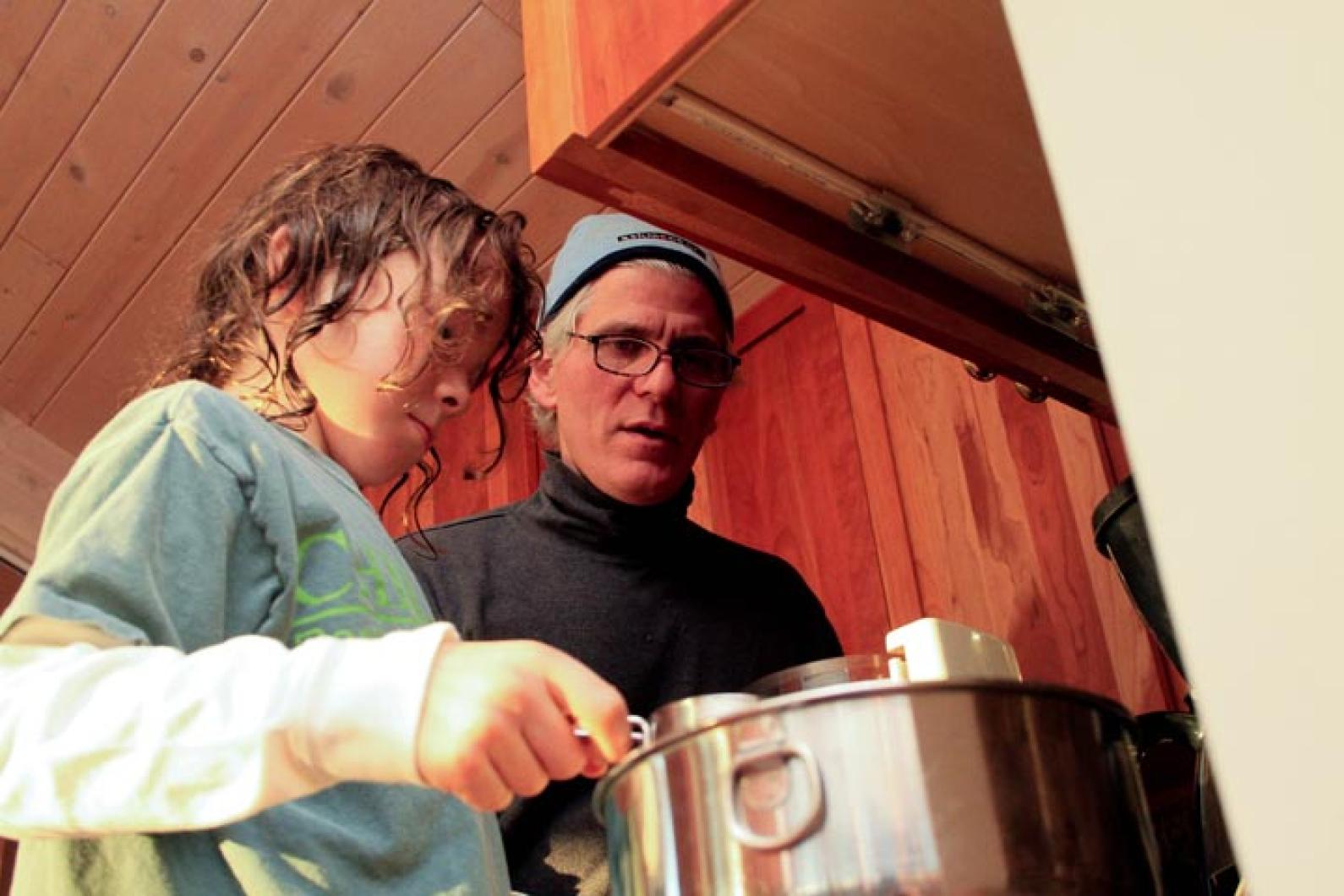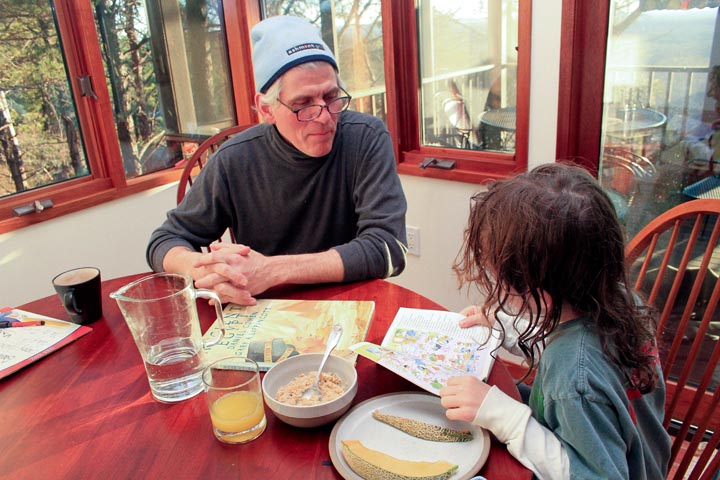For chef Robert Lionette, food is an experience. It has a social and cultural history that goes beyond the flavors conjured up in a restaurant. It should have depth and meaning, and most of all, integrity.
This can take place in a restaurant or, as on a recent Wednesday morning, at his home cooking a breakfast of oatmeal and fresh squeezed orange juice with his son, Jack, age seven. Mr. Lionette is also a frequent volunteer chef at the Chilmark School, and Jack is always an avid participant.
“We cook very simply, very clean,” Mr. Lionette said of himself and his wife, Heather Quinn, who runs the Chilmark Preschool. “And part of it is to make the participation accessible to Jack because he loves to cook with me, but part of it is our shared philosophy to food.”
Simple means tofu, steamed rice, beans, grains, fermented grains, meat, fish, and “tremendous amounts of veg.”
“Mealtime, at any time, I’ve come to find is so vital to family life that it’s the participation and preparation and setting of the table and the clearing of the table, the whole process,” he added. Jack clears the table every night.
Mr. Lionette, 46, has been cooking on the Vineyard and in the Boston area since he was in high school. Growing up on a dairy farm in New Hampshire, food was a part of his family’s culture (“we always had an appetite”) but cooking didn’t become a big part of his life until after college.
“I cooked for five or six years before I started taking it seriously,” he said. He worked in the cafeteria of his boarding school and at restaurants when he attended Tufts University. “And then I was on a trip with a friend in the Thar Desert in India . . . and I had an epiphany, I was not an academic.”
He returned home and began a culinary journey that included many top restaurants in the Boston area.
“It was an opportunity to embrace my political sense, and my social and cultural interest in an area that I enjoyed,” he said.
One of his earliest experiences in the kitchen was working at the Oyster Bar in Oak Bluffs under Raymond Schilcher. Mr. Lionette may have grown up on a dairy farm, but this was his first experience buying straight from a farm, in this case Allen Farm in Chilmark.
“There just wasn’t that opportunity back then ...it didn’t really register with restaurants or producers that you could make direct contacts,” he said. “It was something that had been done generations prior but we had lost that.”
Mr. Lionette took this experience back with him to Boston where from 1994 to 2008 he and his family owned the Garden of Eden, a restaurant in the South End. It was one of the first farm-to-table restaurants in the city. From a 14-seat cafe to a 120-seat restaurant, catering company, market and French bakery, the Garden of Eden thrived during a time when the phrase “farm-to-table” was still in its infancy.
Within ten years of being open, all of the meats, grains, produce, seafood and artisanal products at Garden of Eden were coming from New England farms and producers.
“It was perfect timing,” Mr. Lionette said. “The resources, research and opportunities weren’t there 20 years ago in an urban environment . . . for us the big part of it was luck, we got in at a time when the conversation had just begun.”
When Jack was born, Mr. Lionette went from top scale dining to newborn mentality, and the family began thinking about a move out of the city. They considered Vermont and North Hampton, but a job as head chef at Zephyrus tipped the scales toward Martha’s Vineyard. Since the move three years ago, Mr. Lionette has switched direction, working for Kitchen Porch Catering this past summer and putting a lot of time into figuring out how to accommodate the needs and palettes of his son and classmates at the Chilmark School.
Next Friday he’ll help the students prepare a colonial based meal of butter poached cod, caramelized carrots and maple syrup bread pudding.
The school lunch model is fundamentally dysfunctional, Mr. Lionette said, and needs reworking from the ground up. He said cooking in the kitchen with Jack has helped him see that.
“I think it really informed my participation in the Chilmark lunch program, and solidified how important our time in there is,” he said, pointing to the kitchen. “We love watching our sourdough bubble, watching the yeast bread rise, Jack coming in three hours later to check to see how much it’s gone up. It comes out of the oven hot, steaming, we just rip into it.”
During his time on the Vineyard, Mr. Lionette has seen both extremes — cooking for small children, upscale restaurant clientele and private catering – and found that the year-round community is often forgotten when it comes to providing authentic food.
“This is an odd environment because we serve the one per cent here, it’s what allows us to live here and yet I’ve always felt creativity comes from us and we forget that,” he said. “Our community is what needs to be served first and foremost. We’re part of a 12 month community. I don’t want to just turn turtle six months of the year and come in and reap the benefits.”
Ideas and opportunities on the Vineyard are stewing on the front burner this winter, Mr. Lionette said, and he’s looking to increase his involvement in the community.
“What I want out of this winter, what I need out of this winter, is to pursue my work in food and make it have a significant meaning,” he said.
On Wednesday, Jan. 18, Robert Lionette will present a cooking demonstration from 11 a.m. to 1 p.m. at LeRoux at Home, located at 62 Main street in Vineyard Haven.







Comments (1)
Comments
Comment policy »